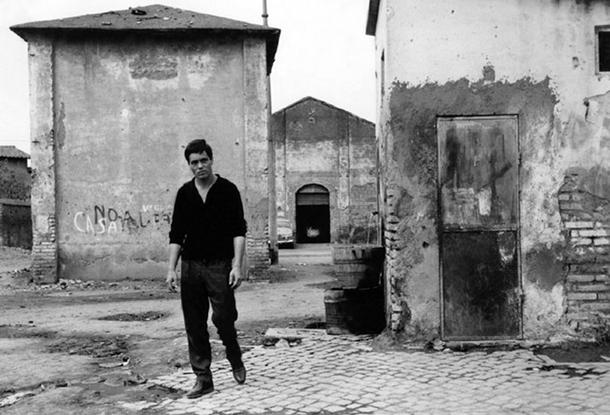
Cast: Franco Citti, Franca Pasut, Silvana Corsini
Director: Pier Paolo Pasolini
Country: Italy
Genre: Drama
Editor’s Notes: The following review is part of our coverage for TIFF’s Pier Paolo Pasolini: The Poet of Contamination which runs from March 8th to April 12th at TIFF Bell Lightbox. For more information on upcoming TIFF film series visit http://tiff.net and follow TIFF on Twitter at @TIFF_NET.
In Pier Paolo Pasolini’s debut feature, Accattone, Pasolini quickly establishes a defining cinematic language that would make saints of sinners and deities from the scourge of the streets. These were the ignoble byproducts of a post-war rebuilding in Italy as a shifting of the framework of nobility would wash upon the ancient chalky shores of Rome and impose new ways of thought onto a proud and impressionable populace. Pasolini sees divinity in the struggles of the miscreants, pimps, thieves, and prostitutes of Italy, finding weary saints in the eyes of men borne into streets ill-suited for the imposition of ubiquitous bourgeoisie thinking. They live like confused warriors and prophets amidst the burgeoning reforms of industrialization, the unwitting slaves of a new social caste that has little tolerance for the wiles of the cunning rogue.
In Pier Paolo Pasolini’s debut feature, Accattone, Pasolini quickly establishes a defining cinematic language that would make saints of sinners and deities from the scourge of the streets.
Pasolini uses non-professional actors to capture an honest rogue’s gallery of the unwilling participants in the new social order as the unceasing tide of consumerism rose around the necks like the gold chain of the macho street hustler, their natural aversion to change borne from a noble ignorance as Bach’s St Matthew Passion offers the struggles of these antiheroes a timeless refrain. Pasolini does not use this unlikely marriage of image and sound as a confrontational juxtaposition to lend noble qualities to the ignoble, but rather to show the eternal struggle of the lower classes as inherently noble. These men are the cast out saints of ancient texts before the world hastily outgrew its divine mysteries and traded them for more profitable concerns. They exploit women, deplore affluence, and are perceptive enough to see the changes taking place around them but lack the influence to do anything about them. They can recognize the undesirable traits of their own exploits, but find the imposition of mild forms of slavery to be a larger sin against man.
Pasolini does not use this unlikely marriage of image and sound as a confrontational juxtaposition to lend noble qualities to the ignoble, but rather to show the eternal struggle of the lower classes as inherently noble.
Accattone chooses to live an ignoble life because it is a better thing to have the illusion of control over one’s destiny than it is to be a slave to more affluent men. He has forged his moniker from accattare (beggar) and wears it as a blighted badge of courage, carrying out a brash and larger than life existence as he wants to be buried with his gold like the Pharaohs of old. His face is blemished and striking like the pock-marked streets of post-war Italy and he lives a life as foretold by the prophesies of street hustlers and thieves. He walks against the flow of a funeral procession in defiance of his own inevitable mortality as he attempts to find his place in the era of more affluent thieves, laughing in the face of starvation and leery of the Roman Catholic church that offers the only honest sustenance at the price of human souls.
Pasolini uses the death rattles of a misogynistic culture to paint biblical saints from the thieves and street hustlers that colored the streets of Rome with antiheroes straddling a line between modern realism and worlds of mystery and ancient prophesies. He makes no moralistic judgments of these characters as they are merely byproducts of the conditions of the time, but instead studies the faces and mannerisms of those that made the era live and breath. They aren’t driven to dishonest deeds like unwitting participants of a neo-realist melodrama. These outcasts live in vehement opposition of the impending demystification and homogenization of a burgeoning first world, leaving us with noble fools who would rather starve than earn an honest living in a vile and dishonest world.
[notification type="star"]88/100 ~ GREAT. Pasolini uses the death rattles of a misogynistic culture to paint biblical saints from the thieves and street hustlers that colored the streets of Rome with antiheroes straddling a line between modern realism and worlds of mystery and ancient prophesies.[/notification]



